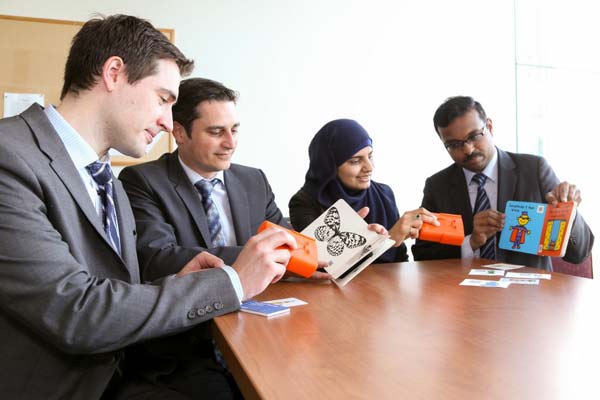
Improving kids’ literacy with singing stickers: U of T social startup goes global
Published: June 23, 2015
A child-friendly handheld device that makes inanimate objects talk and sing is part of a University of Toronto startup’s strategy to improve vocabulary and communication skills for young children in impoverished communities.
“We wanted to create something that was play-based,” said U of T alumna Aisha Bukhari, a co-founder of Attollo Social Enterprise, the team behind the innovation. “We wanted it to be affordable, scalable and loved by children.”
Bukhari and her Attollo colleagues Peter Cinat, Jamie Austin and Lak Chinta are taking their idea to the finals of the Hult Prize, an international student competition dedicated to entrepreneurial approaches to social needs. Attollo is one of six finalist teams winnowed from an original 20,000 entrants in the annual contest.
All four team members are recent graduates of the Rotman Morning MBA program for working professionals. Cinat and Bukhari also have U of T Engineering degrees. (Interested in learning more about entrepreneurship and startups at U of T? Visit U of T's Banting & Best Centre for Innovation & Entrepreneurship.)
The Attollo founders have been attracting attention since last December, when they finished first in the U of T Hult Prize competition. (Read more about the U of T Hult competition here.) The team went on to win the Hult regional rounds in Dubai in March, and are now preparing for the global finals, to be held at the annual meeting of the Clinton Global Initiative in New York this September.
The Hult Prize, which bills itself as the world’s largest student competition, awards US $1 million in seed capital each year to the winning team. Designed to foster social entrepreneurship, the prize – presented by the Hult International Business School in partnership with the Clinton Global Initiative – was named one of the top five ideas changing the world by Bill Clinton and Time magazine. (Read more about the Hult Prize here.)
Attollo's research suggests that more than 100 million impoverished children under the age of six lack the opportunity to develop their cognitive skills fully. Their innovation is designed to address this deficit.
Attollo stickers feature illustrations of familiar objects and come with pre-programmed quick response (QR) codes that are activated by a simple, low-cost reader with playback and recording functions. Parents and caregivers can customize the stickers to talk, sing and read in any language. They are designed to be placed on any household item, transforming it into an educational toy.
The Attollo founders will travel to Hyderabad, India, and Mombasa, Kenya, this summer to pilot their project. They will also spend time at an incubator at the Hult International Business School in Boston, where they will receive mentoring and strategic planning advice.
The team is working on two prototypes. Bukhari said one model is a minimum viable product (MVP) – a basic version of the device – that the team will use to pilot the concept in Hyderabad and Mombasa.
“We’re working with Autodesk Research Toronto on the MVP, with a focus on product design and form factor,” she added.
Another Attollo collaborator is U of T electrical engineering professor David Johns. His company, Icewire Makerspace, is helping the group with electronics to develop a low-cost scalable solution.
“We were impressed by Attollo’s energy and desire to make an impact on early education worldwide,” Johns said. “Although they had an excellent business plan and worthwhile goals, they needed technical help. We want to give the Attollo team support so that they can make the best pitch they possibly can in September.”
Bukhari said piloting the concept and fundraising are Attollo’s main priorities leading up to the Hult Prize final.
“We will iterate the solution and business model based on the field results,” she said.
Jamie Hunter is a writer with the Faculty of Applied Science and Engineering.



